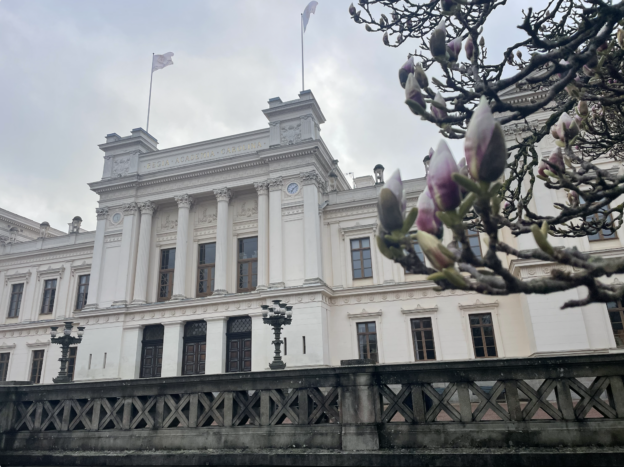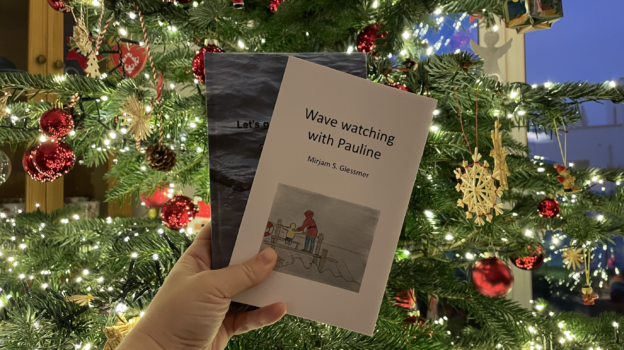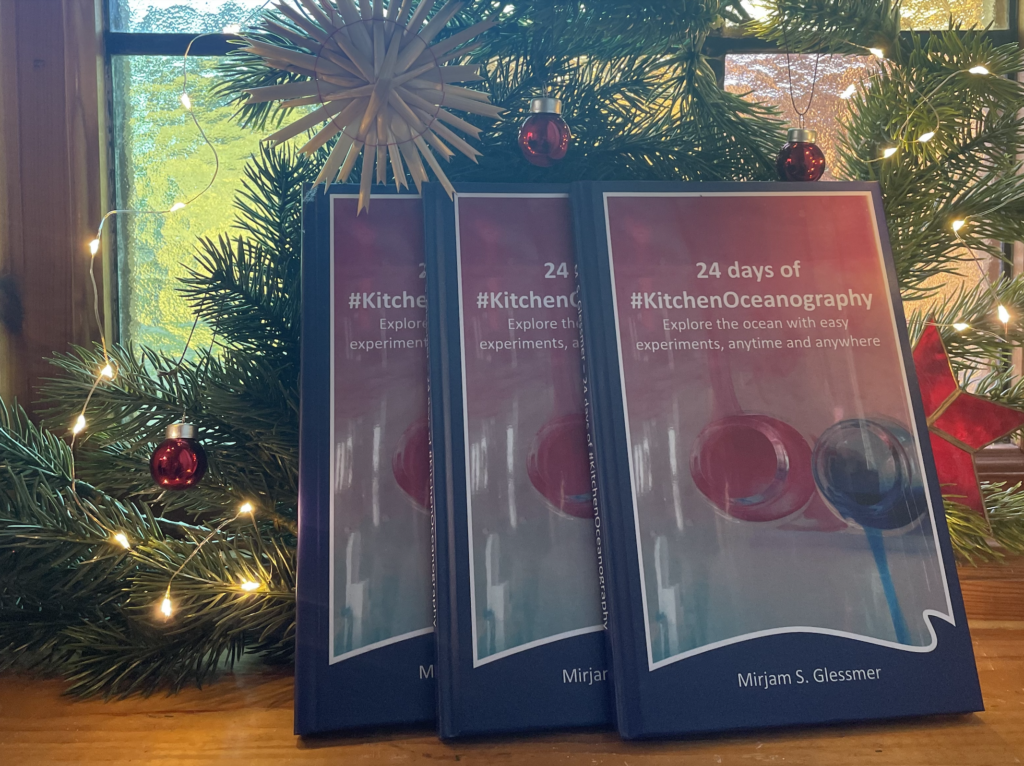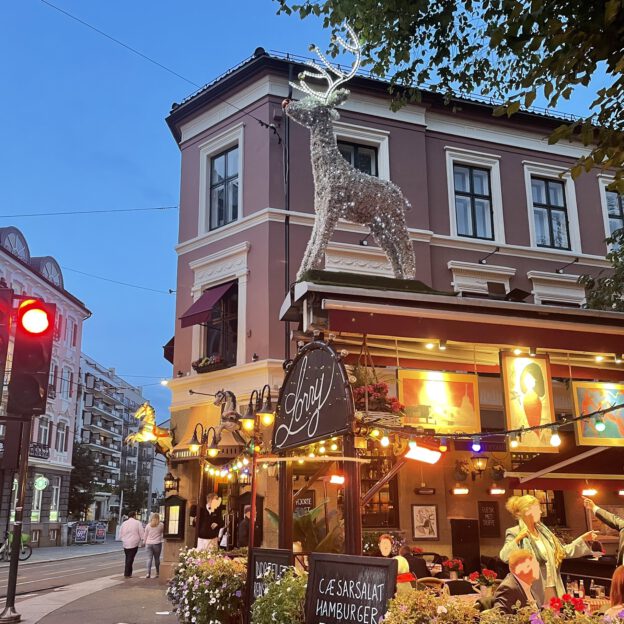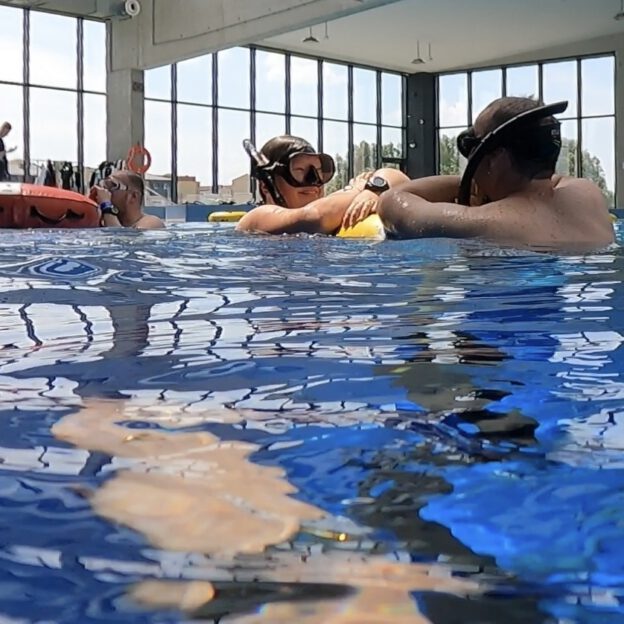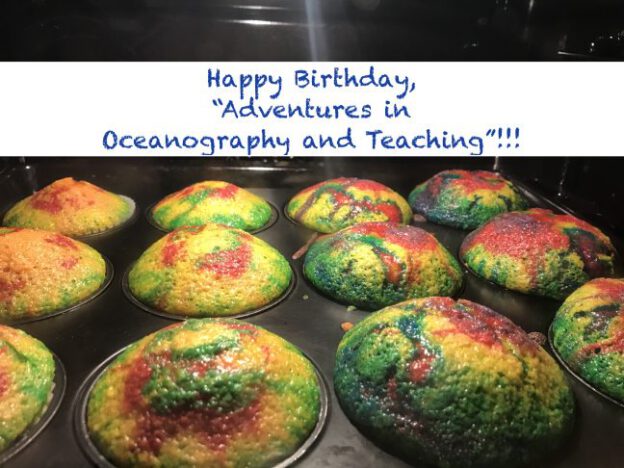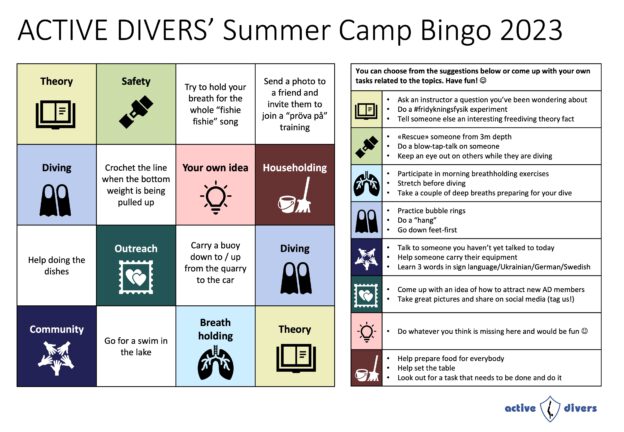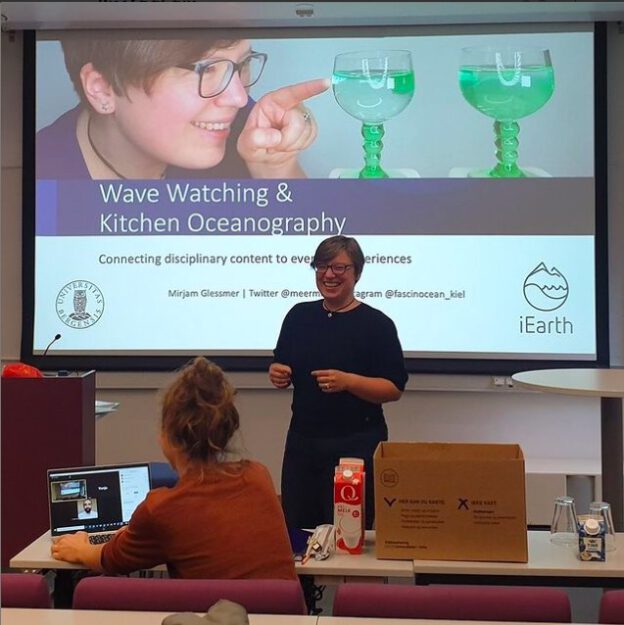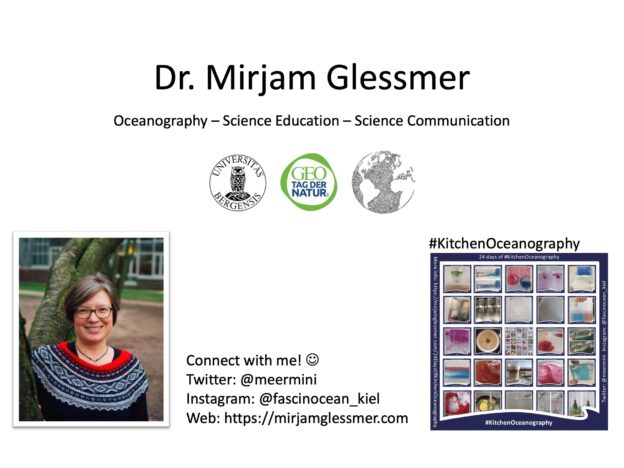For all of you who prefer reading a short-ish blogpost over listening to a nervous Mirjam on a recorded video call on “Career pathways combining education with oceanography“: Read the post below to learn my personal story on the prompt “Many oceanographers find educational activities a rewarding part of their career, where education can range from outreach activities aimed at the general public, to undergraduate and graduate teaching, to training in research through internships and graduate advising. Here three oceanographers describe their experiences working in a variety of educational pathways.” That is the talk I wish I had heard many years ago… (But go watch the recording for Kristi Burkholder and Meg Tivey’s awesome contributions, that are very different from mine! You can always stop watching when I come on ;-))
As you see on my introductory slide (above), I stated there that I was an “oceanographer — science educator — science communicator”. And I want to tell you a little story about what that means.
When I am asked about “what I am”, my first response is that I am a physical oceanographer. And that is true — that is what my identity is all about. If you search for my name on the internet, you find two main keywords: One is #KitchenOceanography and the other is #WaveWatching. Those are two hashtags that I use to describe two hobbies of mine: #KitchenOceanography is about creating hands-on experiments that we can use in teaching and outreach to help us understand the ocean and climate system. #WaveWatching is another hobby — wherever I am, when I see water, I see waves, I have to understand what caused the waves, and then I usually take a picture and post it on social media. So I am an oceanographer. But depending on the context, I might also say that I am a science educator or a science communicator, or any combination of those three, and all of those claims are also true.
I started out on my journey into oceanography by doing a Master’s (equivalent) degree in physical oceanography, and then a PhD. After my PhD I went abroad for my postdoc. My postdoctoral work got published in a Nature Geoscience article on which I was the first author, which was quite positively received and got me invited to speak in many places. Over the next several years, I was involved in several super interesting research campaigns with colleagues from my postdoc days, went on research cruises and to the Coriolis rotating platform in France (a 13-m diameter rotating swimming pool!) to conduct tank experiments. The research we did in France resulted in a Nature article that was published last year. And then in January this year, I started as an adjunct associate professor in the oceanography group at the institution where I did my postdoc.
That’s the classical career so far, when we look at it through the oceanography lens.
But we could also use a different lens. During my PhD, I studied for a Master’s of Higher Education, so I learned and reflected a lot on university teaching. During my postdoc, 25% of my time were dedicated to teaching, and I was lucky enough to be responsible for the “introduction to oceanography” lecture as well as for other courses that dealt with either laboratory experiments or training students on research ships. I additionally taught block courses at other universities. I really enjoyed that part of my job very much, so when I left my postdoc position, I took a position as educational developer. I was not working directly in oceanography then, but the study courses I was responsible for were on shipbuilding and coastal engineering, so close enough that I still felt connected to the ocean. From that service position, I moved on to a research position again, but this time in educational research. And I have been working free-lance on educational projects for many years now.
I already told you that I am currently an adjunct associate professor in the physical oceanography group, and that’s true. The focus of my work, however, is not physical oceanography research, but it’s on education. I am part of a large “Center for Excellence in Education”, and I do educational design and I advise a PhD student and Master students on educational research with questions related to how students at university learn about oceanography.
So that’s the second, the education, lens.
But there is a third one, and that’s the science communication lens. And to me, this is really what made my career my career. When I was teaching so much during my postdoc, I started writing a blog called “Adventures in Oceanography and Teaching”. At the time, that was really not a well thought-out project. I had been using a lot of hands-on experiments in my teaching, and I had been sharing pictures of those on my facebook, and I was getting a lot of positive feedback and good discussions from my network. But as it turns out, facebook is not a great tool to organize your own thoughts, and I couldn’t find pictures and related discussions as easily as I had hoped. So really to organize my own thoughts better, I started the blog. And the blog is what started me out on this third stand, the “science communication” part of my identity. For the last 7 or so years, I have blogged about my “Adventures in Teaching and Oceanography” — sometimes describing hands-on experiments that people can use in teaching and outreach, sometimes reflecting on literature on science education or communication that I had read, sometimes showing interesting phenomena I came across on the beach, or on puddles in the street.
The blog is what made it possible for me to transition from oceanography into education, and also from educational research into science communication, because I had built a written portfolio of activities in all these fields. And my blogging and social media were partly inspired by what I was doing in different jobs at the time, but they always stayed focussed on the “Adventures in Oceanography and Teaching”.
About 2.5 years ago, I decided that I would take a part-time position as science communicator to pay my rent, and spend the rest of my free time on the fun projects that had developed both as hobbies and as freelance projects along the way, but without the pressure of having to make a living off of them. So I am currently the program manager of a large science communication project, on a 50% position.
When you search the internet for me these days, however, what you see most prominently are those two hashtags, #KitchenOceanography and #WaveWatching, and that I am someone who works on improving ocean science communication in university teaching and outreach. That is how I see myself, and that’s the image I cultivate through my blog and my social media. Because of that, I have stayed visible to many people at the institution where I did my postdoc, had the opportunity to work on many exciting projects with them while I was working other jobs, and was eventually offered this adjunct associate position. I’ve also been contacted by many people who have hired me to do projects with them or invited me to speak — like today here for MPOWIR.
I want to wrap this up by sharing with you my vision of my ideal job. When I imagine an ideal day, I am doing all the things I am currently doing. I live close to the sea and close to my family (and even though I haven’t talked about that, that definitely influenced my decisions along the way). In the ideal day, I develop hands-on experiments to teach oceanography with, I blog, I talk to my colleagues about their teaching, I work with students, sometimes I lead workshops. I could frame my life right now as “I’m working 50% on a job that is marginally related, and 20% as this, and 30% as that”. But I don’t, because I have this bigger vision for what I want to do and who I am, and that has helped me find my way through many twists and turns to where I am at now.
And now all the small things I do as a hobby, or freelance, or for different employers in different places, contribute to the big picture of my career in both oceanography and education, as an oceanographer, working on engaging others in the wonders of physical oceanography! :)
Watch the webinar below (if you must ;-))
